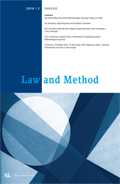|
Developing the capacity for moral judgment is an essential professional competence for lawyers. What teaching and learning activities in the law curriculum can be used in order to contribute to students’ moral reasoning and moral judgment? Four teaching methods were tried out in the period 2019 to 2021 at the Utrecht University School of Law: teaching methods that either work with (hypothetical) dilemmas (I); in-class reflection papers (II); experiential learning based on own experiences in a simulation situation (III); or clinical teaching in a real law firm (IV). The effects of these methods on the development of moral reasoning were measured using the Defining Issues Test (DIT). Additional information on the effectiveness and utility of the method was gathered using semi-structured interviews with teachers. The DIT results were compared at the beginning and at the end of the courses and related to the teaching methods. This article presents the outcomes of this study and formulates some recommendations for further research on the topic. |


Law and Method
About this journalSubscribe to the email alerts for this journal here to receive notifications when a new issue is at your disposal.
March, 2022
Expand all abstracts
| Artikel |
|
| Keywords | moral reasoning, legal education, scholarship of teaching and learning, defining issues test |
| Authors | Emanuel van Dongen and Steven Raaijmakers |
| AbstractAuthor's information |

 Issue 07
Issue 07